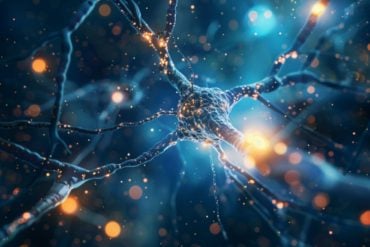Summary: A new study finds a strong association between teen cannabis use and a significantly increased risk of developing psychotic disorders. This risk appears to be age-dependent, with adolescents being particularly vulnerable to the effects of cannabis on their developing brains. While further research is needed, these findings raise concerns about early cannabis use and highlight the importance of prevention strategies.
Key Facts:
- Teens using cannabis are 11 times more likely to develop psychotic disorders.
- The association is stronger in adolescence than young adulthood.
- Most teens diagnosed with psychotic disorders have a history of cannabis use.
Source: Institute for Clinical Evaluative Sciences
A new study published in the journal Psychological Medicine estimates that teens using cannabis are at 11 times higher risk of developing a psychotic disorder compared to teens not using cannabis.
This finding suggests that the association between cannabis and psychotic disorders may be stronger than indicated by previous research, which has relied largely on older data when cannabis was less potent than today. For context, the average THC potency of cannabis in Canada has increased from roughly 1% in 1980 to 20% in 2018.

Researchers from the University of Toronto, the Centre for Addiction and Mental Health (CAMH), and ICES, linked recent population-based survey data from over 11,000 youth in Ontario, Canada, to health service use records including hospitalizations, emergency department (ED) visits, and outpatient visits.
The study is the first to show an age-dependent association between self-reported cannabis use and subsequent psychotic disorder diagnosis, which adds to a growing body of research on the mental health risks associated with cannabis.
“We found a very strong association between cannabis use and risk of psychotic disorder in adolescence. Surprisingly, we didn’t find evidence of association in young adulthood,” says lead author André McDonald, who conducted the study at ICES as part of his PhD at the University of Toronto. McDonald is now a postdoctoral fellow at the Peter Boris Centre for Addictions Research and the Michael G. DeGroote Centre for Medicinal Cannabis Research at McMaster University.
“These findings are consistent with the neurodevelopmental theory that teens are especially vulnerable to the effects of cannabis.”
Of the teens who were hospitalized or visited an ED for a psychotic disorder, roughly 5 in 6 had previously reported cannabis use. McDonald points out that, “the vast majority of teens who use cannabis will not develop a psychotic disorder, but according to these data, most teens who are diagnosed with a psychotic disorder likely have a history of cannabis use.”
The researchers could not completely rule out reverse causation, in that teens with psychotic symptoms may have been self-medicating with cannabis before receiving a clinical diagnosis. They also could not account for potentially important factors such as genetics and history of trauma.
These limitations make it impossible to say definitively that teen cannabis use causes psychotic disorders. The authors also note that their estimates are only approximate, suggesting that further studies with larger samples are required.
Nevertheless, the findings add to worries about early cannabis use, particularly in the wake of legalization.
“As commercialized cannabis products have become more widely available, and have a higher THC content, the development of prevention strategies targeting teens is more important than ever,” says senior author Susan Bondy, an affiliate scientist at ICES and associate professor at the University of Toronto’s Dalla Lana School of Public Health.
McDonald adds, “Canadian youth are among the heaviest users of cannabis in the world. If we follow the precautionary principle, the bottom line is that more needs to be done to prevent early cannabis use.”
About this psychosis and CUD research news
Author: Misty Pratt
Source: Institute for Clinical Evaluative Sciences
Contact: Misty Pratt – Institute for Clinical Evaluative Sciences
Image: The image is credited to Neuroscience News
Original Research: Open access.
“Age-dependent association of cannabis use with risk of psychotic disorder” by André McDonald et al. Psychological Medicine
Abstract
Age-dependent association of cannabis use with risk of psychotic disorder
Background
Epidemiologic research suggests that youth cannabis use is associated with psychotic disorders. However, current evidence is based heavily on 20th-century data when cannabis was substantially less potent than today.
Methods
We linked population-based survey data from 2009 to 2012 with records of health services covered under universal healthcare in Ontario, Canada, up to 2018. The cohort included respondents aged 12–24 years at baseline with no prior psychotic disorder (N = 11 363). The primary outcome was days to first hospitalization, ED visit, or outpatient visit related to a psychotic disorder according to validated diagnostic codes. Due to non-proportional hazards, we estimated age-specific hazard ratios during adolescence (12–19 years) and young adulthood (20–33 years). Sensitivity analyses explored alternative model conditions including restricting the outcome to hospitalizations and ED visits to increase specificity.
Results
Compared to no cannabis use, cannabis use was significantly associated with psychotic disorders during adolescence (aHR = 11.2; 95% CI 4.6–27.3), but not during young adulthood (aHR = 1.3; 95% CI 0.6–2.6). When we restricted the outcome to hospitalizations and ED visits only, the strength of association increased markedly during adolescence (aHR = 26.7; 95% CI 7.7–92.8) but did not change meaningfully during young adulthood (aHR = 1.8; 95% CI 0.6–5.4).
Conclusions
This study provides new evidence of a strong but age-dependent association between cannabis use and risk of psychotic disorder, consistent with the neurodevelopmental theory that adolescence is a vulnerable time to use cannabis. The strength of association during adolescence was notably greater than in previous studies, possibly reflecting the recent rise in cannabis potency.






